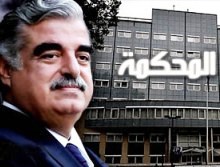 Lawyers for four suspects accused of a 2005 bomb blast that killed former Lebanese prime minister Rafik al-Hariri and 21 others accused prosecutors on Friday of relying on circumstantial evidence and of having established no motive for the attack.
Lawyers for four suspects accused of a 2005 bomb blast that killed former Lebanese prime minister Rafik al-Hariri and 21 others accused prosecutors on Friday of relying on circumstantial evidence and of having established no motive for the attack.
The trial, before an international tribunal in The Hague, is being watched closely in Lebanon, where many hope it could help end a culture of impunity that has sustained a decades-long tradition of political violence in the deeply divided country.
The defense lawyers, appointed to represent the suspects who are still at large and are being tried in absentia, said the prosecution evidence, based on extensive phone records, was not specific enough to prove their clients were involved.
“This crime seems bereft of any motive. The prosecution has put forward no reason… After nine years they don’t have the wherewithal to explain (the motive),” Vincent Courcelle-Labrousse, a lawyer for suspect Hussein Hassan Oneissi, said at the end of the second day of the trial.
“What we have heard is a scenario with some hypotheses,” he told reporters. “But hypotheses are not proof.”
The Hague-based Special Tribunal for Lebanon (STL) was set up after Hariri’s killing with the backing of the United Nations and the then-Lebanese government to investigate the events surrounding the assassination, which brought the country back to the brink of civil war.
“WELL-ORGANISED”
The accused – who also include Mustafa Badreddine, Salim Jamil Ayyash and Assad Hassan Sabra – face charges of terrorism, homicide and of orchestrating the 2005 assassination. A fifth suspect, Hassan Habib Merhi, faces separate but similar charges. They could face a life sentence if convicted.
Prosecutors say the alleged conspirators organized the “well-funded, well-organized and meticulously planned operation” using dozens of mobile phones, some of which were bought months before they were used to coordinate the bomb blast.
On the second day of the trial, prosecutors used evidence culled from telephone companies’ records of billions of text messages and telephone calls to argue that there had been a flurry of phone calls in the small hours of the night before the Feb. 14 blast.
But the defense lawyers said the evidence, showing where the alleged conspirators’ mobile phones had been and whom they had called or texted, and the duration of those calls, could lend support to any number of alternative explanations.
“What did Badreddine say to Ayyash and what did Sabra say to Merhi? Right now there is nothing that reveals the content of these conversations,” said Antoine Korkmaz, lawyer for Badreddine, accused by prosecutors of being the ringleader.
Korkmaz added that the prosecution has also failed to provide any motive for why Hariri was killed.
“Who had an interest in killing Hariri at the time? The prosecution doesn’t even know. We still don’t know the motive,” he said.
March 14 politicians who accompanied former premier Saad Hariri to The Hague commented on this point, saying “Hezbollah’s interest in murdering Hariri was proved by the developments that followed the crime, when the party sought to strike and weaken Future Movement and paralyze Fouad Siniora’s government, as well prevented the election of a president from the March 14 forces and prevent the March 14 camp from governing the country although it won the 2005 and 2009 elections.”
They also mentioned “the toppling of Saad Hariri’s government and forcing him to stay outside Lebanon.”
“If this is the Defense’s approach and strategy in defending the accused in the assassination of Hariri , the Prosecution will not have to make a major effort to convince the judges of its case,” the March 14 politicians added.
Reuters/ agencies

Leave a Reply
You must be logged in to post a comment.